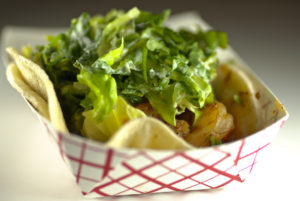Where does the modern family eat dinner when dad wants Chinese food, mom is craving tacos and the kids lobby for burgers and fries? The answer is the modern gourmet food truck.
The history of mobile food service can be traced to the 1600s when people sold eatables from push carts, and later, to the sale of milk and ice from horse-drawn wagons in the 19th century. Food was also served from chuck wagons in the 1800s, but it was intended for cowboys working western cattle trails rather than the general public.
The earliest installment of the “lunch wagon” is attributed to Walter Scott who peddled sandwiches, pies and coffee to blue collar workers in Providence, Rhode Island in the 1870s.
By the 1950s, mobile canteens fabricated from modified trucks were common in many parts of the United States, especially near construction sites and factories. The uncertain health standards of some inspired the term “roach coach” that lingered without due cause well into the 20th century.
Fast forward to the 21st century when gourmet food trucks are disrupting the traditional food services industry.
Gourmet Mobile Food Trucks
 Chef Roy Choi is widely credited with launching the renaissance of the food truck into a more respectable espression. His Kogi Korean BBQ truck took to the streets of Los Angeles in 2008, selling $2.00 Korean BBQ tacos and more. His enterprises now include a stand-up dining bar called Alibi Room and the sit-down restaurant Chego that specializes in rice bowls. Other chefs followed suit.
Chef Roy Choi is widely credited with launching the renaissance of the food truck into a more respectable espression. His Kogi Korean BBQ truck took to the streets of Los Angeles in 2008, selling $2.00 Korean BBQ tacos and more. His enterprises now include a stand-up dining bar called Alibi Room and the sit-down restaurant Chego that specializes in rice bowls. Other chefs followed suit.
The recession that started in 2007 was tough on the restaurant industry, inspiring those with a passion for the culinary arts to seek non-conventional sources of income. That motivation coincided with the rise of social media, enabling mobile chefs to reach potential customers via Tweets and Facebook posts.
Food truck businesses are often challenging given the required investment in equipment, vehicle maintenance, health department standards, municipal permits and increasing competition. Still, there is “always room for one more,” especially for those striking the right balance of location, food quality and selection, and personal ambition.
Local Food Trucks
The food truck industry is “expanding worldwide” according to Mobile-Cuisine. The online publication offers helpful information to vendors about subjects including equipment sales, licensing, business plans, insurance, accounting, finance, recipes, marketing, social media, technology, events and employment.
There are about 200 licensed food trucks in Sonoma County near the CrossCheck headquarters. Some are totally independent vendors who manage the challenge of finding permitted locations as well as food production. Others rely on aggregators such as Off the Grid to establish legal marketplaces for food trucks. The group claims to be in 27 cities and 45 weekly locations with a weekly attendance of over 60,000 people.
 Some existing businesses not serving food will negotiate deals with specific mobile food vendors to park nearby, thus creating a beneficial situation for both businesses as well as a hungry public.
Some existing businesses not serving food will negotiate deals with specific mobile food vendors to park nearby, thus creating a beneficial situation for both businesses as well as a hungry public.
Furthermore, a handful of conventional restaurants and catering companies have launched mobile skins to join the food truck party.
Whatever the business plan and wherever the route, all food trucks must have a method of accepting the widest variety of payment types. While cash is still king, accepting credit and debit cards via handheld devices presents unlimited opportunities.
Enter ProcessNow Mobile by Constant Processing, the most reliable and competitive mobile payment system on the US market. The service processes debit and credit cards using magstripe readers in conjunction with iOS or Android smartphones and tablets. Contact us today to learn how ProcessNow Mobile can help your food truck business accept payments anywhere at any time.
